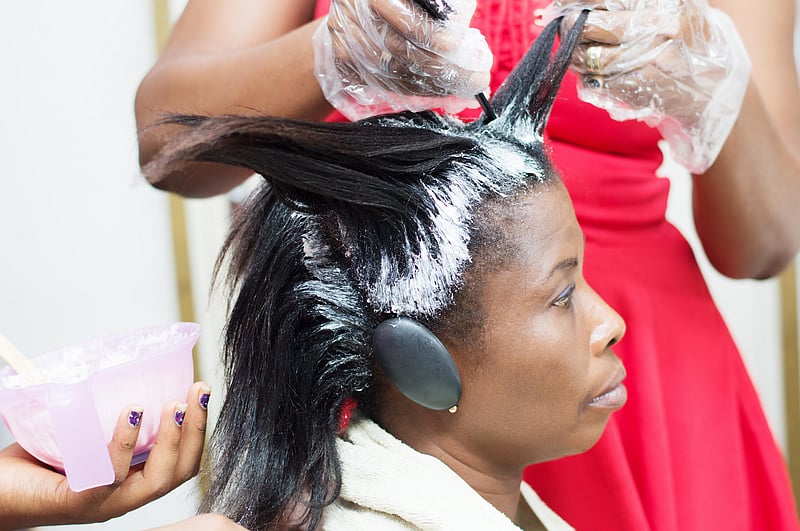Manténgase sano!
Resultados de su búsqueda "Hair And Scalp Problems: Misc.".
Resultados de noticias de salud - 14
A proposed ban on formaldehyde in chemical hair straightening products -- linked to cancer and other health risks -- has hit a roadblock after an executive order from President Donald Trump paused all new regulations.
The U.S. Food and Drug Administration (FDA) has
Early research in mice suggests a new path forward to restoring hair growth in people affected by a form of alopecia.
Alopecia areata is an autommune disorder that affects an estimated 6 million Americans and has no cure, according to researchers at the Massachusetts Institute of Technology (MIT) in Boston.
The condition causes immune system T-cells to attack hair follic...
- Ernie Mundell HealthDay Reporter
- |
- May 13, 2024
- |
- Página completa
The U.S. Food and Drug Administration has proposed a ban on the use of formaldehyde in hair relaxers over concerns about its link to respiratory problems and certain cancers.
Right now, the FDA only discourages u...
- Cara Murez HealthDay Reporter
- |
- October 18, 2023
- |
- Página completa
Older Black women who use chemical hair relaxers may be more likely to develop uterine cancer, new research suggests.
Specifically, postmenopausal Black women who reported using hair relaxers more than twice a year or for more than five years had more than a 50% increased risk of being diagnosed with uterine cancer compared to women who rarely or never used relaxers.
"Black women ha...
- Denise Mann HealthDay Reporter
- |
- October 13, 2023
- |
- Página completa
Have you seen more hair in the shower or on the bathroom floor than usual?
Grab a mirror and take a look at your head. If it looks like you're "going bald,"you may have androgenic alopecia (male pattern baldness).
According to the Clevela...
- Meredith Morckel HealthDay Reporter
- |
- June 7, 2023
- |
- Página completa
Hair relaxers may slightly affect fertility, a factor most likely to impact women who are Black or Hispanic, according to a new study.
Research led by Boston University School of Public Health found that these chemical hair straightene...
- Cara Murez HealthDay Reporter
- |
- April 28, 2023
- |
- Página completa
Folks develop gray hair as they age because color-producing stem cells become "stuck"and disabled in the hair follicle, new animal research contends.
Hair color is controlled by melanocyte stem cells (McSCs), which as they mature produce the protein pigments that turn people into brunettes, blondes and redheads.
During normal hair growth, these cells are continually on the move, tra...
- Dennis Thompson HealthDay Reporter
- |
- April 19, 2023
- |
- Página completa
Hair loss can be devastating for women, but the condition can also signal additional health problems.
An American Academy of Dermatology expert offers information about the types of hair loss seen in women with darker skin tones, common types of medical conditions associated with hair loss and treatment options.
"Research shows that women who experience hair loss can also have other...
- Cara Murez HealthDay Reporter
- |
- March 17, 2023
- |
- Página completa
TUESDAY, Feb. 28, 2023 (HealthDay Now) -- A long-established Alzheimer's drug can help people with a disorder that causes them to compulsively pull at their hair or pick at their skin, a new clinical trial has concluded.
Memantine considerably improved symptoms in 3 out of 5 patients with either trichotillomania (hair-pulling disorder) or excoriation (skin-picking) disorder, researchers r...
- Dennis Thompson HealthDay Reporter
- |
- February 28, 2023
- |
- Página completa
Women who regularly use chemical hair straighteners may be more prone to developing uterine cancer, a new large government study suggests.
The study, which followed nearly 34,000 U.S. women over a decade, found that those who frequently used hair straighteners were 2.5 times more likely to de...
- Amy Norton HealthDay Reporter
- |
- October 20, 2022
- |
- Página completa
The strange smells and sounds at an animal shelter can stress out even the most placid pup, and invasive tests to see if they need medicine to calm down only add to the anxiety.
So there's some good news for Fido in new research out of the Netherlands.
The study found that analyzing a single sample of a...
- Cara Murez HealthDay Reporter
- |
- April 25, 2022
- |
- Página completa
The often-used steroid spironolactone is not linked to any increased risk of a range of common cancers, according to a new study.
The synthetic steroid is routinely used to manage heart failure, high blood pressure and edema, and also used off-label to treat acne, hair loss and excessive hair growth (hirsutism).
Healthy looking facial hair starts with healthy skin -- even if you're Santa.
The American Academy of Dermatology suggests some tips to prevent dandruff, ingrown hair<...
- |
- December 24, 2021
- |
- Página completa
When hair sprouts where you don't want it, you can always shave, but other ways to remove unwanted body hair can last longer.
The downside: Chemical hair removers can cause burning, itching or redness.
"Hair removal creams, lotions and gels are quick and easy to use, but they can sometimes irritate the skin," dermatologist Dr. Andrea Mabry said in an American Academy of Dermatology ...
- |
- September 19, 2021
- |
- Página completa


















